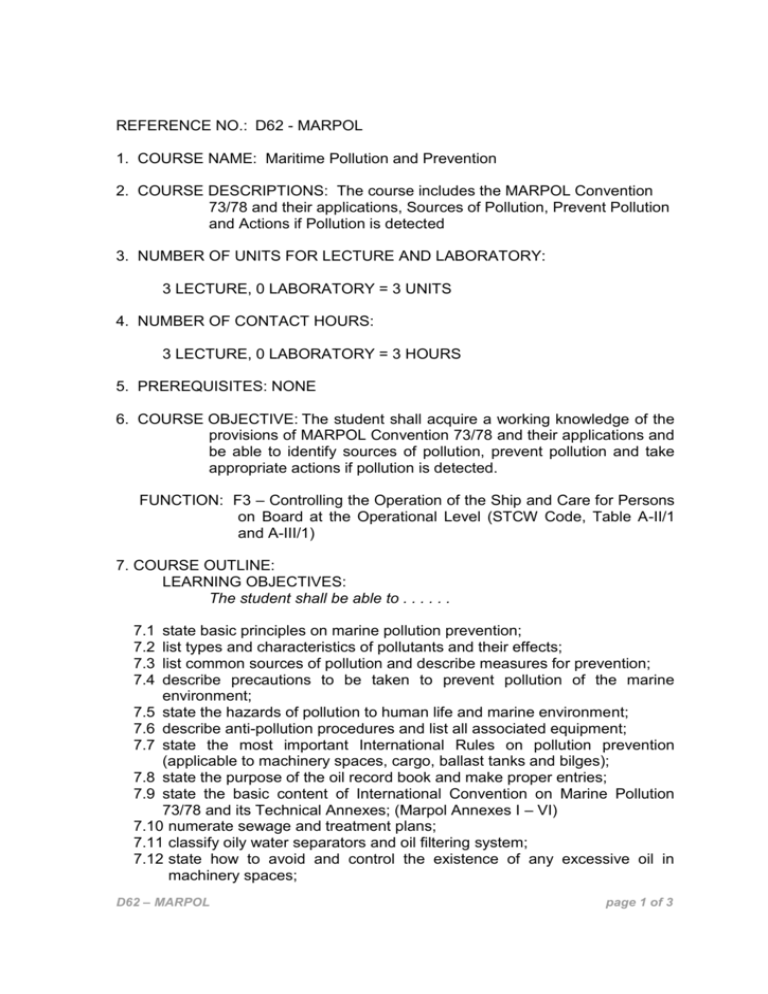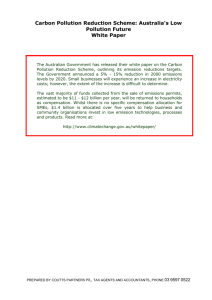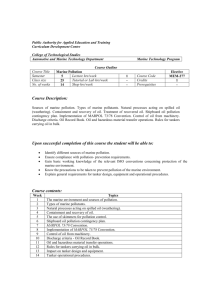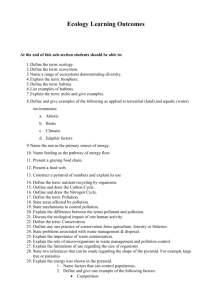Marpol
advertisement

REFERENCE NO.: D62 - MARPOL 1. COURSE NAME: Maritime Pollution and Prevention 2. COURSE DESCRIPTIONS: The course includes the MARPOL Convention 73/78 and their applications, Sources of Pollution, Prevent Pollution and Actions if Pollution is detected 3. NUMBER OF UNITS FOR LECTURE AND LABORATORY: 3 LECTURE, 0 LABORATORY = 3 UNITS 4. NUMBER OF CONTACT HOURS: 3 LECTURE, 0 LABORATORY = 3 HOURS 5. PREREQUISITES: NONE 6. COURSE OBJECTIVE: The student shall acquire a working knowledge of the provisions of MARPOL Convention 73/78 and their applications and be able to identify sources of pollution, prevent pollution and take appropriate actions if pollution is detected. FUNCTION: F3 – Controlling the Operation of the Ship and Care for Persons on Board at the Operational Level (STCW Code, Table A-II/1 and A-III/1) 7. COURSE OUTLINE: LEARNING OBJECTIVES: The student shall be able to . . . . . . 7.1 7.2 7.3 7.4 state basic principles on marine pollution prevention; list types and characteristics of pollutants and their effects; list common sources of pollution and describe measures for prevention; describe precautions to be taken to prevent pollution of the marine environment; 7.5 state the hazards of pollution to human life and marine environment; 7.6 describe anti-pollution procedures and list all associated equipment; 7.7 state the most important International Rules on pollution prevention (applicable to machinery spaces, cargo, ballast tanks and bilges); 7.8 state the purpose of the oil record book and make proper entries; 7.9 state the basic content of International Convention on Marine Pollution 73/78 and its Technical Annexes; (Marpol Annexes I – VI) 7.10 numerate sewage and treatment plans; 7.11 classify oily water separators and oil filtering system; 7.12 state how to avoid and control the existence of any excessive oil in machinery spaces; D62 – MARPOL page 1 of 3 7.13 state the hazards involved from improper handling of petroleum products; 7.14 numerate safety precautions to observe when handling petroleum products and actions to take in emergency situations; 7.15 explain the consequences of OPA ’90 for ship operation; 7.16 state considerations to be made and actions to take before any waste is disposed of, i.e. in special areas if dumped or pumped into the sea; 7.17 explain the purpose of Regional Cooperation on Pollution Prevention, Preparedness and appropriate responses to an incident of pollution; 7.18 state the most common sources of oil wastes, chemicals and other sources of pollutants and explain how these wastes shall be dealt with; 7.19 state the principal aims of the Shipboard Oil Pollution and Emergency Plan (SOPEP) and give a brief description of the basic elements to be included in SOPEP (Regulation 26 of Annex I of MARPOL). 8. EQUIPMENT, MATERIALS, CHEMICALS, TEACHING AIDS: 8.1 Video on: 8.1.1 Prevention and Reaction to Marine Oil Spills – The Seafarer’s Role 8.1.2 Drawings on MARPOL Equipment on Board 8.1.3 Oil Record Book and Ballast Record Book 8.2 Video on: Fighting Pollution – Prevention of Pollution At Sea 8.3 Video on: Response Options 9. REFERENCES: 9.1 ICS/OCIMF. Clean Seas Guide for Oil Tankers. London: Witherby & Co. Ltd. ISBN 0-948691-15-8. 9.2 Instructions for the Keeping of Oil Record Books on Board Ships (MEPC/Circ. 111) 9.3 Gold, Edgar. Gard Handbook on Marine Pollution, Assuranceforeningen Gard, Arendal. Norway 1998. ISBN 82-90344-11-2. 9.4 Regulation for the Prevention of Pollution by Oil (IMO Sales No. 525 86.01.E). 9.5 International Convention for the Prevention of Pollution from Ships (MARPOL). 1973, IMO Sales No. 516.86.14E. 9.6 International Convention on Oil Pollution Preparedness, Response and Cooperation. 1990. 9.7 Protocol 1 of MARPOL 73/78 as amended: Provisions Concerning the Reporting of Incidents Involving Harmful Substances under MARPOL 73/78. IMO Sales No. 516.86.14E. 9.8 Oily Water Separators and Monitoring Equipment IMO Sales No. 608 87.10E. 9.9 Crude Oil Washing Systems. IMO Sales No. 617 83.08E. 9.10 Dedicated Clean Ballast Tanks. IMO Sales No. 619 82.11E. 9.11 Format for Reporting Alleged Inadequacy of Oily Wastes Reception Facilities (MREOC/Circ. 160). D62 – MARPOL page 2 of 3 9.12 Marine Environment Protection Committee Resolution MEPC 30(25) – Guidelines for Reporting Incidents Involving Harmful Substances. 9.13 Assembly Resolution A. 598 (15) - General Principles for Reporting Systems and Ship Reporting Requirements. 9.14 IMO Model Course 7.03, 1999 Edition. ISBN 92-801-6105-9. 9.15 San Diego, Teresita, Obleplas, Lino Dabi. Workbook in Maritime Pollution and Prevention. D62 – MARPOL page 3 of 3






